Is the carbon tax an easy scapegoat for high food prices? OUI!
CBC
Sat, October 7, 2023
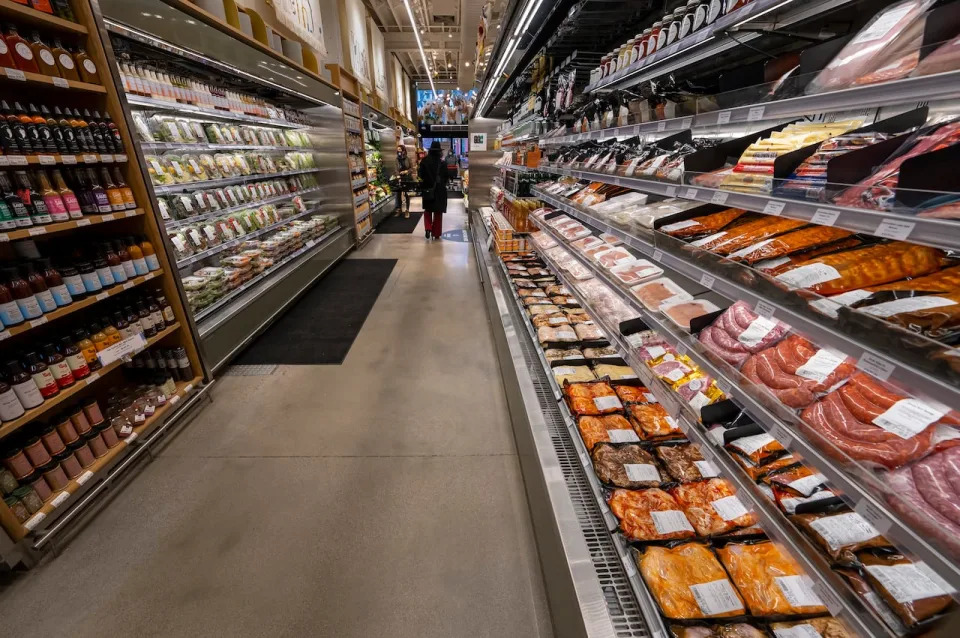
The Summerhill Market in Toronto on Wednesday February 2, 2022. The affordability argument against carbon pricing ignores some inconvenient facts. (Frank Gunn/The Canadian Press - image credit)
Seven years ago this week, Justin Trudeau stood in the House of Commons and announced that his government would implement a national price on carbon emissions.
It remains one of the boldest and most consequential decisions of his time in office. It's also one of the most loudly contested — even after two federal elections that might have been expected to settle the issue.
This week, the House voted on yet another Conservative motion calling on MPs to condemn the carbon tax — the Official Opposition's fifth such motion in the last 12 months. This time, the Conservatives were able to win the support of one Liberal backbencher — Ken McDonald, who represents the Newfoundland riding of Avalon — illustrating the public consternation Liberal climate policies are facing in Atlantic Canada.
But the Conservatives are also hammering away with television ads that blame the carbon tax for the high price of groceries, an argument that might hold particular power as Canadians prepare to celebrate Thanksgiving.
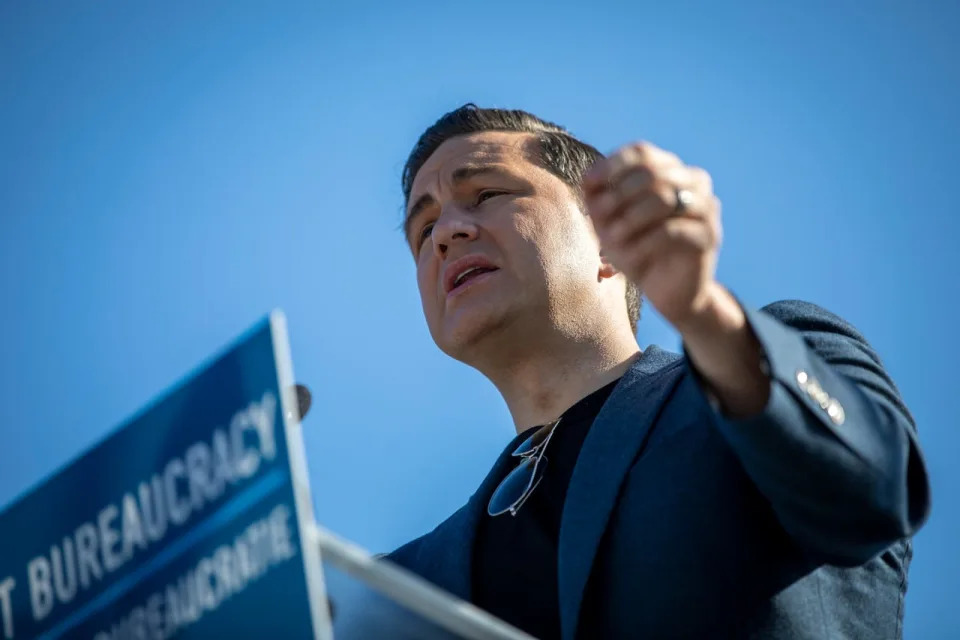
Pierre Poilievre, leader of the Conservative Party of Canada, is pictured during a press conference in Vancouver, B.C, on Thursday, September 14, 2023.
Conservative Leader Pierre Poilievre's statements about the impact carbon pricing has on affordability ignore one big factor: the rebates. (Ben Nelms/CBC)
"Mr. Speaker, when one taxes the fuel of the farmers who make the food and the fuel of the truckers who ship the food, then one taxes all those who buy the food," Conservative Leader Pierre Poilievre told the House this week, ably reenacting his party's ads.
This period of high inflation certainly presents a fresh political test for any climate policy that creates a new cost for industry or consumers. But in the debate about food prices, the carbon tax is being saddled with an outsized and undeserved role — one that, ironically, distracts from the very real impact climate change and extreme weather are having, and will have, on the cost of groceries.
What's really driving up food prices?
It's not that the carbon tax has no impact on food prices and inflation. It's just not obvious that it is having a particularly large impact.
The Bank of Canada has estimated that the carbon tax increases inflation by 0.15 per cent. Trevor Tombe, an economist at the University of Calgary who has studied the impact of the carbon price on consumer costs, points to Statistics Canada data that suggests its impact on food prices is less than one per cent.
That's not nothing, and every dollar counts when it comes to the cost of essentials, particularly for those on low incomes.
But concerns about the impact of the carbon tax also tend to ignore the fact that the policy has two parts — a fuel charge collected by the federal government and a rebate that returns 90 per cent of the revenue generated by the levy to Canadian households. (The remaining 10 per cent is directed toward businesses, farmers and Indigenous communities.)
Unlike any number of other federal and provincial policies that might be said to contribute to the cost of food — from corporate taxes to food safety regulations — the federal carbon tax comes with a rebate.
The parliamentary budget officer has consistently found that nearly all households receive more from the rebate than they pay in direct and indirect costs. Only households in the highest income quintile are projected to pay out more than they receive — because they consume more. Repealing the carbon tax could actually leave many Canadians worse off.
Recent polling suggests a sizeable number of Canadians like the idea of reducing or eliminating the carbon tax. Maybe the same would be true of a poll about any kind of tax. Regardless, the Liberals might need to redouble efforts now to make the case for one of Trudeau's signature policies.
But any discussion of food prices has to include the impact of climate change — the very problem that the carbon tax is meant to help combat.
An analysis from Statistics Canada published last November linked "erratic weather" — including droughts, heat waves, flooding and heavy rainfall — with increases in the prices of meat, fruit, vegetables, sugar and coffee. In June, economists at RBC reported that, while food price inflation was expected to slow, a return to pre-pandemic prices was unlikely — in part because "extreme weather events are becoming more frequent across different regions and could meaningfully limit farm production."
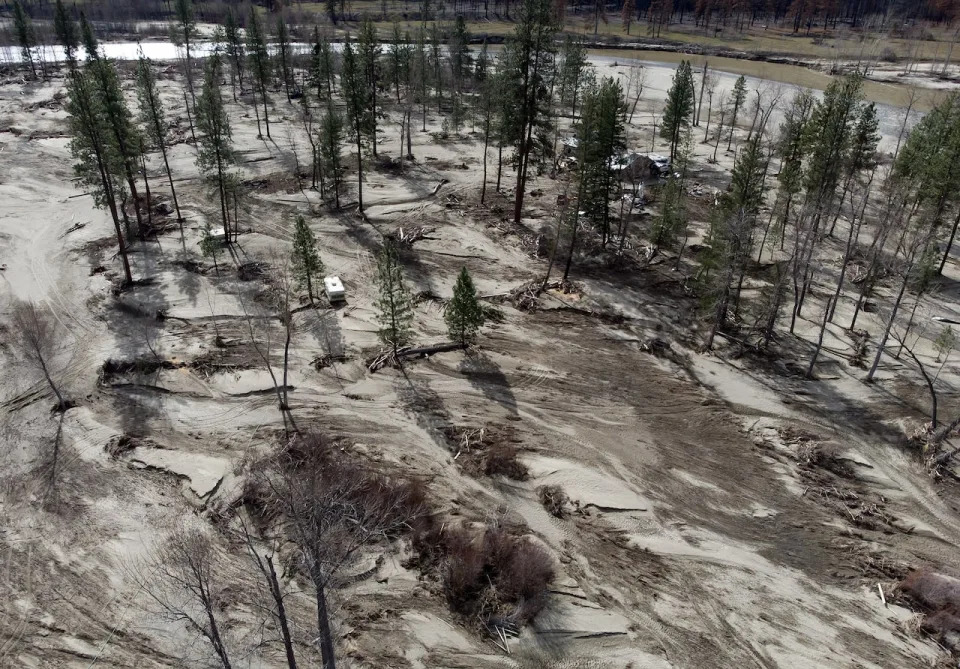
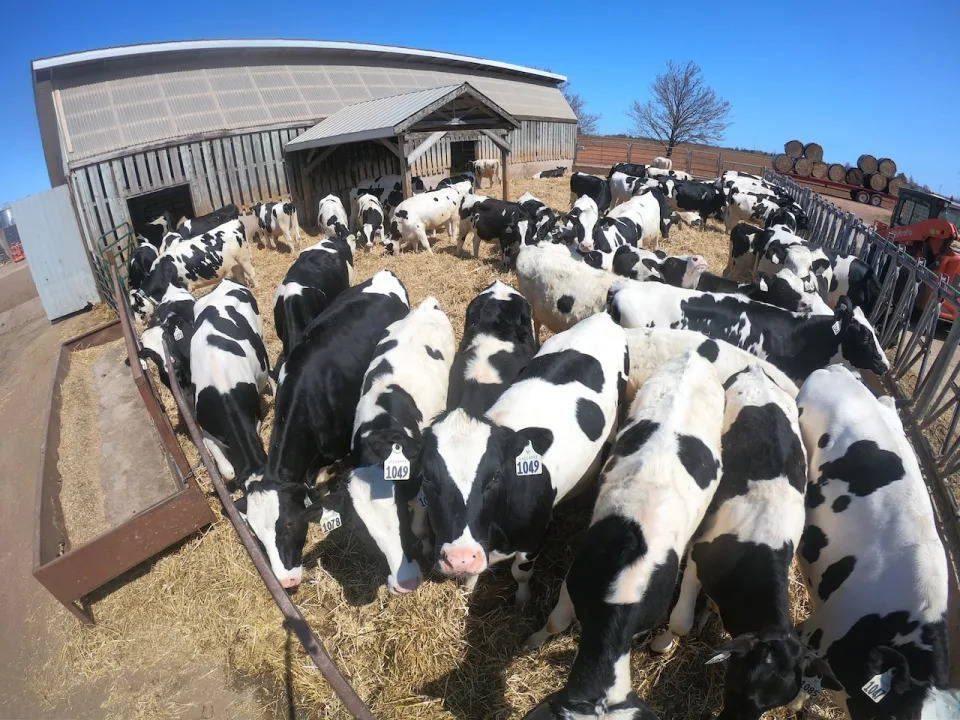
The Bryanton family has been farming in Belmont-Lot 16 for over 35 years. They got in to the dairy industry in 2006 and also farm about 700 acres of land.Supply management retains broad support in mainstream Canadian politics, even though it drives up the cost of food.
CBC
Sat, October 7, 2023

The Summerhill Market in Toronto on Wednesday February 2, 2022. The affordability argument against carbon pricing ignores some inconvenient facts. (Frank Gunn/The Canadian Press - image credit)
Seven years ago this week, Justin Trudeau stood in the House of Commons and announced that his government would implement a national price on carbon emissions.
It remains one of the boldest and most consequential decisions of his time in office. It's also one of the most loudly contested — even after two federal elections that might have been expected to settle the issue.
This week, the House voted on yet another Conservative motion calling on MPs to condemn the carbon tax — the Official Opposition's fifth such motion in the last 12 months. This time, the Conservatives were able to win the support of one Liberal backbencher — Ken McDonald, who represents the Newfoundland riding of Avalon — illustrating the public consternation Liberal climate policies are facing in Atlantic Canada.
But the Conservatives are also hammering away with television ads that blame the carbon tax for the high price of groceries, an argument that might hold particular power as Canadians prepare to celebrate Thanksgiving.

Pierre Poilievre, leader of the Conservative Party of Canada, is pictured during a press conference in Vancouver, B.C, on Thursday, September 14, 2023.
Conservative Leader Pierre Poilievre's statements about the impact carbon pricing has on affordability ignore one big factor: the rebates. (Ben Nelms/CBC)
"Mr. Speaker, when one taxes the fuel of the farmers who make the food and the fuel of the truckers who ship the food, then one taxes all those who buy the food," Conservative Leader Pierre Poilievre told the House this week, ably reenacting his party's ads.
This period of high inflation certainly presents a fresh political test for any climate policy that creates a new cost for industry or consumers. But in the debate about food prices, the carbon tax is being saddled with an outsized and undeserved role — one that, ironically, distracts from the very real impact climate change and extreme weather are having, and will have, on the cost of groceries.
What's really driving up food prices?
It's not that the carbon tax has no impact on food prices and inflation. It's just not obvious that it is having a particularly large impact.
The Bank of Canada has estimated that the carbon tax increases inflation by 0.15 per cent. Trevor Tombe, an economist at the University of Calgary who has studied the impact of the carbon price on consumer costs, points to Statistics Canada data that suggests its impact on food prices is less than one per cent.
That's not nothing, and every dollar counts when it comes to the cost of essentials, particularly for those on low incomes.
But concerns about the impact of the carbon tax also tend to ignore the fact that the policy has two parts — a fuel charge collected by the federal government and a rebate that returns 90 per cent of the revenue generated by the levy to Canadian households. (The remaining 10 per cent is directed toward businesses, farmers and Indigenous communities.)
Unlike any number of other federal and provincial policies that might be said to contribute to the cost of food — from corporate taxes to food safety regulations — the federal carbon tax comes with a rebate.
The parliamentary budget officer has consistently found that nearly all households receive more from the rebate than they pay in direct and indirect costs. Only households in the highest income quintile are projected to pay out more than they receive — because they consume more. Repealing the carbon tax could actually leave many Canadians worse off.
Recent polling suggests a sizeable number of Canadians like the idea of reducing or eliminating the carbon tax. Maybe the same would be true of a poll about any kind of tax. Regardless, the Liberals might need to redouble efforts now to make the case for one of Trudeau's signature policies.
But any discussion of food prices has to include the impact of climate change — the very problem that the carbon tax is meant to help combat.
An analysis from Statistics Canada published last November linked "erratic weather" — including droughts, heat waves, flooding and heavy rainfall — with increases in the prices of meat, fruit, vegetables, sugar and coffee. In June, economists at RBC reported that, while food price inflation was expected to slow, a return to pre-pandemic prices was unlikely — in part because "extreme weather events are becoming more frequent across different regions and could meaningfully limit farm production."

. Provincial government ministers are scheduled to visit the region Thursday for an update on the work taking place to rebuild the road that connects Spences Bridge with Merritt.Mud and debris covers a farm on the Nicola River that was destroyed by flooding in November, west of Merritt, B.C., on Wednesday, March 23, 2022.
(Darryl Dyck/The Canadian Press)
Other sources of inflation cited by RBC include Russia's invasion of Ukraine, supply chain disruptions and labour shortages. And Canada is hardly alone in feeling the impact on food prices.
Kelleen Wiseman, academic director of the master of food and resource economics program at the University of British Columbia, said price increases from extreme weather events typically are temporary. But Mike von Massow, a professor of food economics at the University of Guelph, said "the impact of climate [on food prices] is at least an order of magnitude bigger than the impact of the carbon tax."
"I think that there is little doubt that extreme weather, the increasing frequency and severity, is not only causing food price inflation but will lead to ongoing greater instability in food prices," vow Massow said. "It'll be much more difficult to predict where we're going because of the unpredictability of these weather events."
In hopes of containing prices, the federal government has put its focus on major retailers. Von Massow said that what's really needed is a broader "food system discussion" that brings all the players together to talk about building a resilient, integrated system that can withstand the forces that climate change is unleashing.
Why is the carbon tax taking the blame?
Tombe, who has also dismissed the utility of blaming retailers, has suggested it would make more sense to look at dismantling the supply management system for dairy and poultry in Canada. Regardless of how one feels about that proposal, it's at least interesting to note that no political party is choosing to make supply management a target right now — while scorn is being heaped on the carbon tax.
Across the federal parties, support for supply management is virtually unanimous. Killing it might lower prices of milk, eggs and chicken for consumers. But the major parties apparently have calculated that the political and practical benefits of the system outweigh its costs — that the trade-offs are worth it.
Other sources of inflation cited by RBC include Russia's invasion of Ukraine, supply chain disruptions and labour shortages. And Canada is hardly alone in feeling the impact on food prices.
Kelleen Wiseman, academic director of the master of food and resource economics program at the University of British Columbia, said price increases from extreme weather events typically are temporary. But Mike von Massow, a professor of food economics at the University of Guelph, said "the impact of climate [on food prices] is at least an order of magnitude bigger than the impact of the carbon tax."
"I think that there is little doubt that extreme weather, the increasing frequency and severity, is not only causing food price inflation but will lead to ongoing greater instability in food prices," vow Massow said. "It'll be much more difficult to predict where we're going because of the unpredictability of these weather events."
In hopes of containing prices, the federal government has put its focus on major retailers. Von Massow said that what's really needed is a broader "food system discussion" that brings all the players together to talk about building a resilient, integrated system that can withstand the forces that climate change is unleashing.
Why is the carbon tax taking the blame?
Tombe, who has also dismissed the utility of blaming retailers, has suggested it would make more sense to look at dismantling the supply management system for dairy and poultry in Canada. Regardless of how one feels about that proposal, it's at least interesting to note that no political party is choosing to make supply management a target right now — while scorn is being heaped on the carbon tax.
Across the federal parties, support for supply management is virtually unanimous. Killing it might lower prices of milk, eggs and chicken for consumers. But the major parties apparently have calculated that the political and practical benefits of the system outweigh its costs — that the trade-offs are worth it.

The Bryanton family has been farming in Belmont-Lot 16 for over 35 years. They got in to the dairy industry in 2006 and also farm about 700 acres of land.Supply management retains broad support in mainstream Canadian politics, even though it drives up the cost of food.
(Nicola MacLeod/CBC)
The presence of the rebate minimizes the degree to which the federal carbon tax requires any kind of trade-off. But to the degree carbon pricing does increase costs for fuel and other goods, the trade-off is reducing the greenhouse gas emissions that cause climate change.
Economists have long argued that putting a price on carbon is the least expensive way to drive emissions down. And Trudeau is hardly alone in accepting that logic. According to the World Bank, 23 per cent of global emissions are now covered by some kind of pricing policy — up from 13 per cent in 2016.
The federal carbon tax might someday come to be as politically untouchable as supply management. For now, the Conservatives seem to believe it's in their interests to direct anger at the carbon tax — even while they seem unable to say what they would do instead to reduce emissions.
But if climate policy is going to be scapegoated every time the price of groceries goes up, Canada is going to have a very hard time sustaining a serious response to climate change.
The presence of the rebate minimizes the degree to which the federal carbon tax requires any kind of trade-off. But to the degree carbon pricing does increase costs for fuel and other goods, the trade-off is reducing the greenhouse gas emissions that cause climate change.
Economists have long argued that putting a price on carbon is the least expensive way to drive emissions down. And Trudeau is hardly alone in accepting that logic. According to the World Bank, 23 per cent of global emissions are now covered by some kind of pricing policy — up from 13 per cent in 2016.
The federal carbon tax might someday come to be as politically untouchable as supply management. For now, the Conservatives seem to believe it's in their interests to direct anger at the carbon tax — even while they seem unable to say what they would do instead to reduce emissions.
But if climate policy is going to be scapegoated every time the price of groceries goes up, Canada is going to have a very hard time sustaining a serious response to climate change.
Trudeau’s Government Launches Plan to Stabilize Canada’s Food Prices
Laura Dhillon Kane
Thu, October 5, 2023

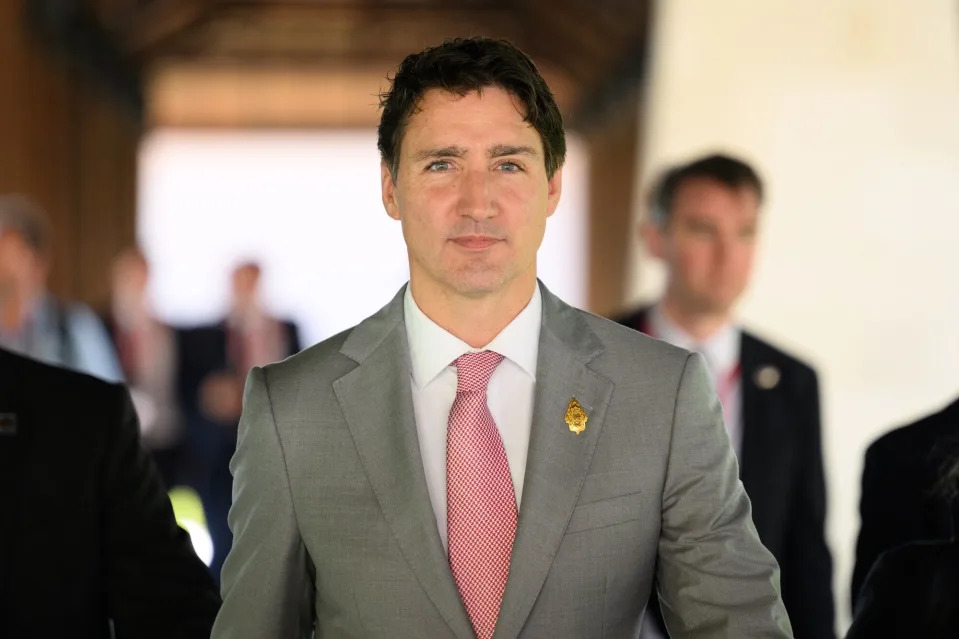
(Bloomberg) -- Prime Minister Justin Trudeau’s government outlined the first steps of a plan to stabilize food prices as Canadians continue to hammer his Liberal Party in the polls over the high cost of living.
Industry Minister Francois-Philippe Champagne and Finance Minister Chrystia Freeland provided details on Thursday, several weeks after meeting with executives of grocery stores and food manufacturers.
Champagne said the top five grocery chains — Walmart Inc., Loblaw Cos., Metro Inc., Empire Co. and Costco Wholesale Corp. — have agreed to support efforts to restore price stability to store shelves. Shares of the Canadian grocers showed little immediate reaction to the news.
Canadians can expect to “soon” see aggressive discounts across a basket of key food products for most households, as well as price freezes and price-matching campaigns, he said.
“Bottom line, we’re going to hold their feet to the fire,” Champagne said.
Trudeau announced last month that his government would demand grocery-store executives restore price stability as part of a suite of measures aimed at making life more affordable. The skyrocketing cost of food and housing in Canada has plunged the prime minister’s popularity to career lows in many polls.
Trudeau has decried grocers for making “record profits” while Canadians struggle to put food on the table, pushing food-bank use to new heights.
Grocery inflation slowed to 6.9% in August compared with 8.5% in July, but it still outpaced headline inflation of 4%.
If the government doesn’t see results from grocers and food manufacturers, it will take additional action including potentially imposing a tax on grocers, the ministers warned on Thursday. “No measures are off the table,” Freeland said.
Champagne rejected criticism from industry observers who say food inflation is expected to slow in coming months regardless of his government’s efforts, and that many grocers typically freeze prices over the winter holiday season, refusing to accept price hikes from suppliers during a crucial shopping period.
The minister said each of the five major grocers provided him with individual plans to stabilize prices and those initiatives will have an impact. “If you look at the measures they’re looking to take, for example a basket of discounted goods, the extent of that and the scope of it is more than what we have seen in Canada.”
The grocers will also be forced to compete with each other as their plans roll out and they see lower prices elsewhere, he said. “What we have been able to create in Canada is a competitive pressure that did not exist before.”
Keeping food prices as low as possible has been the top priority for Canada’s grocers since inflation surged at the end of the pandemic, said Michelle Wasylyshen, spokesperson for the Retail Council of Canada, in a statement.
Canada’s food inflation is lower than that of many other developed countries including the UK, Australia and France, and should fall further in coming months as input costs start to ease. Between 70% and 80% of checkout prices are determined before the food hits the shelves, she said. “It therefore remains critical that all members of the complex supply chain address their respective roles in food pricing.”
Champagne has said he also met with food manufacturers, including Nestle and Kraft Heinz Co., and urged them to play a role in slowing food inflation.
He also announced Thursday that the government will strengthen the Office of Consumer Affairs by creating a Grocery Task Force, which will monitor the grocers and manufacturers on a monthly basis and investigate practices such as “shrinkflation,” in which the price of an item remains stable but the weight or size gets smaller.
The government will also speed up industry-led work to establish a Grocery Code of Conduct to support fairness and transparency across the sector, as well as create a data hub for food price information including the cost breakdown throughout the supply chain, he said.
Trudeau’s government has also introduced a bill to amend the Competition Act in an effort to boost competition in the grocery sector, though the changes will affect all industries.
The government is also facing pressure to reduce its fiscal footprint, and to that end, Treasury Board President Anita Anand announced new guidelines for public sector managers who contract out professional services.
Bloomberg Businessweek
Laura Dhillon Kane
Thu, October 5, 2023


(Bloomberg) -- Prime Minister Justin Trudeau’s government outlined the first steps of a plan to stabilize food prices as Canadians continue to hammer his Liberal Party in the polls over the high cost of living.
Industry Minister Francois-Philippe Champagne and Finance Minister Chrystia Freeland provided details on Thursday, several weeks after meeting with executives of grocery stores and food manufacturers.
Champagne said the top five grocery chains — Walmart Inc., Loblaw Cos., Metro Inc., Empire Co. and Costco Wholesale Corp. — have agreed to support efforts to restore price stability to store shelves. Shares of the Canadian grocers showed little immediate reaction to the news.
Canadians can expect to “soon” see aggressive discounts across a basket of key food products for most households, as well as price freezes and price-matching campaigns, he said.
“Bottom line, we’re going to hold their feet to the fire,” Champagne said.
Trudeau announced last month that his government would demand grocery-store executives restore price stability as part of a suite of measures aimed at making life more affordable. The skyrocketing cost of food and housing in Canada has plunged the prime minister’s popularity to career lows in many polls.
Trudeau has decried grocers for making “record profits” while Canadians struggle to put food on the table, pushing food-bank use to new heights.
Grocery inflation slowed to 6.9% in August compared with 8.5% in July, but it still outpaced headline inflation of 4%.
If the government doesn’t see results from grocers and food manufacturers, it will take additional action including potentially imposing a tax on grocers, the ministers warned on Thursday. “No measures are off the table,” Freeland said.
Champagne rejected criticism from industry observers who say food inflation is expected to slow in coming months regardless of his government’s efforts, and that many grocers typically freeze prices over the winter holiday season, refusing to accept price hikes from suppliers during a crucial shopping period.
The minister said each of the five major grocers provided him with individual plans to stabilize prices and those initiatives will have an impact. “If you look at the measures they’re looking to take, for example a basket of discounted goods, the extent of that and the scope of it is more than what we have seen in Canada.”
The grocers will also be forced to compete with each other as their plans roll out and they see lower prices elsewhere, he said. “What we have been able to create in Canada is a competitive pressure that did not exist before.”
Keeping food prices as low as possible has been the top priority for Canada’s grocers since inflation surged at the end of the pandemic, said Michelle Wasylyshen, spokesperson for the Retail Council of Canada, in a statement.
Canada’s food inflation is lower than that of many other developed countries including the UK, Australia and France, and should fall further in coming months as input costs start to ease. Between 70% and 80% of checkout prices are determined before the food hits the shelves, she said. “It therefore remains critical that all members of the complex supply chain address their respective roles in food pricing.”
Champagne has said he also met with food manufacturers, including Nestle and Kraft Heinz Co., and urged them to play a role in slowing food inflation.
He also announced Thursday that the government will strengthen the Office of Consumer Affairs by creating a Grocery Task Force, which will monitor the grocers and manufacturers on a monthly basis and investigate practices such as “shrinkflation,” in which the price of an item remains stable but the weight or size gets smaller.
The government will also speed up industry-led work to establish a Grocery Code of Conduct to support fairness and transparency across the sector, as well as create a data hub for food price information including the cost breakdown throughout the supply chain, he said.
Trudeau’s government has also introduced a bill to amend the Competition Act in an effort to boost competition in the grocery sector, though the changes will affect all industries.
The government is also facing pressure to reduce its fiscal footprint, and to that end, Treasury Board President Anita Anand announced new guidelines for public sector managers who contract out professional services.
Bloomberg Businessweek
No comments:
Post a Comment